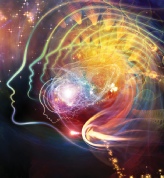



 NEXT
NEXT
 BACK
BACK
 Forum
Forum


Philosophical musings on Quanta & Qualia; Materialism & Spiritualism; Science & Religion; Pragmatism & Idealism, etc.





Spiritual Science
Why Science Needs Spirituality to Make Sense of the World
Steve Taylor (2018)
“An alternative way of conceiving consciousness”
Post 97. August 19, 2019
Panspiritualism
Enformationism vs Panpsychism
In Philosophy Now magazine (April/May 2019), Steve Taylor wrote an article describing an updated version of the ancient notion of universal consciousness. As he says, “Panpsychism1 answers the question of how mind could arise out of matter by claiming that mind was always in matter.” And that is exactly the point of my own personal thesis of Enformationism. However, the traditional interpretation of “psyche”2 referred to human-
Taylor notes that “only structures that have the necessary complexity and organizational form to receive and channel fundamental consciousness into themselves are individually alive, and individually conscious.” Nevertheless, he says, “according to panspiritualism, the entire universe is animate and conscious, since all things are animated with spirit.” But, in my own thesis, I have tried to avoid the outdated religious baggage of terms like “spirit” and “consciousness”, by using instead the more technical scientific term “Information”. We are all familiar with that word in its traditional sense of mental contents, such as ideas and images. But in the 20th century, Claude Shannon used it in reference to the mathematical and mechanical function of codes, such as the data encoded in DNA or the data transmitted digitally over wires in dots & dashes. Now, in the 21st century, we are all acquainted with the novel notion of Information as the invisible stuff that serves as the input and output of computers. But it’s much more than that.
The author goes on to relate his concept of “spirit” with fundamental features of physics, such as gravity or electro-
Post 97 continued . . . click Next
1. Panpsychism :
“In philosophy, panpsychism is the view that mind or a mind-
2. Psyche :
Greek : Breath = Life
“In psychology, the psyche is the totality of the human mind, conscious and unconscious.” ___Wiki
Anima, Pneuma, Atman, Soul. Spirit, Life Force, Persona, Mind, Intellect, Self
3. Panspirituality :
“The quality or state of finding the spiritual manifest throughout the physical universe.” ___Wiki
The function of Information :
•In the form of Matter is being (stuff, objects)
•In the form of Energy is doing (action, change)
•In the form of Life is evolving (progress)
• In the form of Mind is knowing (ideas, memes)
Science and Spirituality :
I respectfully disagree with the subtitle of Mr. Taylor’s book. What we now know as the scientific method was originally called Natural Philosophy. And its methods were primarily theoretical, hence difficult to disprove in cases where theories disagreed.
Modern science has been so fruitful partly because it focused on empirical evidence. Any disputes can be resolved pragmatically by demonstrating which theory works in practice. That’s how Einstein’s concept of gravity was proven by observations of light deflected by mass.
The success of empirical Science left theoretical Philosophy with little to do but speculate on mushy metaphysics. But now the cutting edge of Physics and Chemistry, and even Cosmology is slicing into metaphysical mush on the quantum level of reality. Yet technology continues to advance without any tincture of spirituality.
So, I think it’s actually the philosophical profession that needs to evolve from its empirical envy, and take the lead in interpreting the conceptual enigmas that practical science will never touch. That’s why Philosophy needs to take Spirituality seriously, in order to make sense of the immaterial aspects of the world.
The Human Psyche
